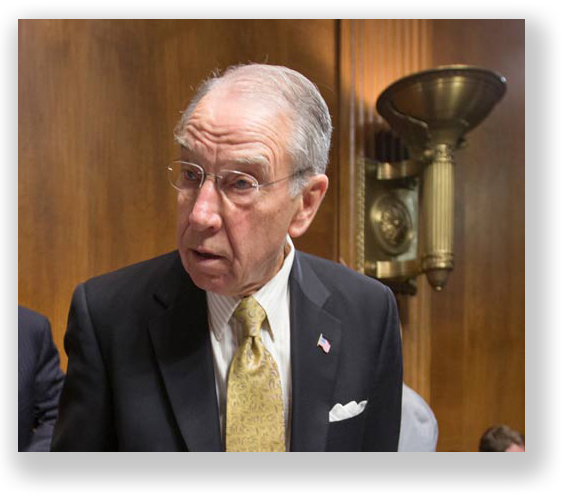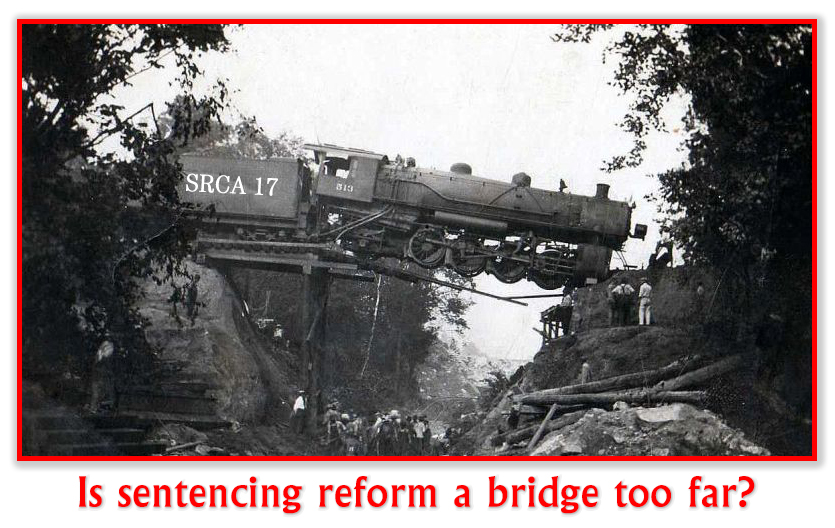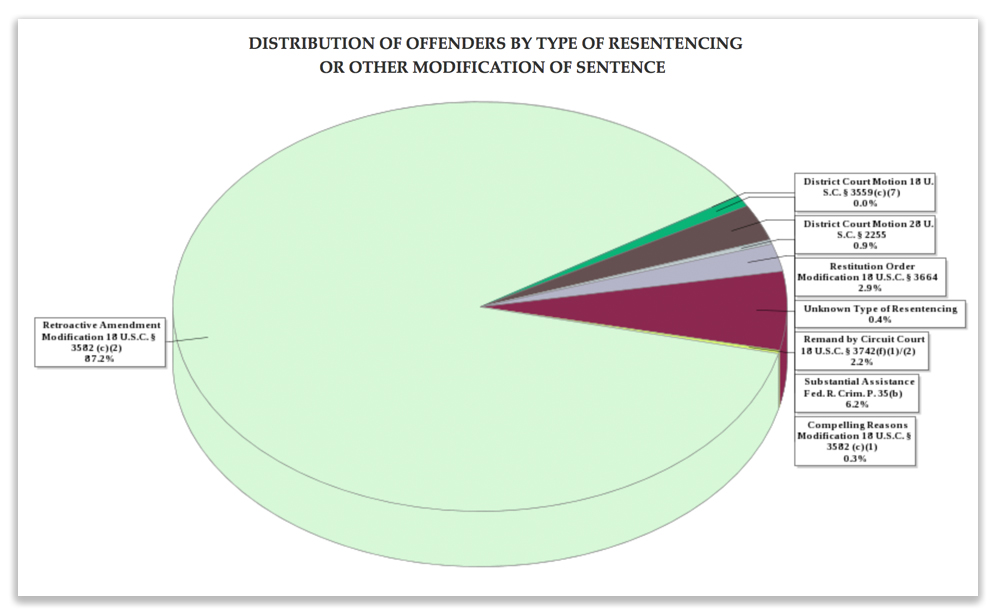We post news and comment on federal criminal justice issues, focused primarily on trial and post-conviction matters, legislative initiatives, and sentencing issues.
THRILLS, CHILLS, AS SENTENCING REFORM GETS KICKED AROUND WASHINGTON
It’s kind of like a made-for-TV thriller, with all sorts of disconnected story lines swirling around the central theme of sentencing reform.
 Starting with the good news/bad news on pardons: President Trump issued the third grant of clemency (and second pardon) of his presidency last Friday to former Navy sailor Kristian Saucier, who learned the news while driving a garbage truck, the only job he could find with a felony conviction. Saucier, who was sentenced to a year in prison in 2016 for taking pictures inside a nuclear submarine, was repeatedly cited by Trump during his presidential campaign as being “ruined” for doing “nothing,” while Hillary Clinton mishandled classified information and used a personal email account while serving as secretary of state, only to receive a “pass” from the FBI.
Starting with the good news/bad news on pardons: President Trump issued the third grant of clemency (and second pardon) of his presidency last Friday to former Navy sailor Kristian Saucier, who learned the news while driving a garbage truck, the only job he could find with a felony conviction. Saucier, who was sentenced to a year in prison in 2016 for taking pictures inside a nuclear submarine, was repeatedly cited by Trump during his presidential campaign as being “ruined” for doing “nothing,” while Hillary Clinton mishandled classified information and used a personal email account while serving as secretary of state, only to receive a “pass” from the FBI.
The bad news is that Trump so far has only granted clemency to people whose stories have contributed to his political narrative (Sheriff Joe Arpaio) or who had powerful political and financial friends (Sholom Rabashkin). There is no indication he cares to do anything about inmates not falling into either category.
Hopes that Trump may support sentencing reform were rekindled slightly this past week as the White House launched the Federal Interagency Council on Crime Prevention and Improving Reentry, intended to reduce crime while looking for ways to “provide those who have engaged in criminal activity with greater opportunities to lead productive lives.”
 Trump’s executive order calls for “mental health, vocational training, job creation, after-school programming, substance abuse, and mentoring,” for inmates. “Incarceration is necessary to improve public safety,” the Administration said, “but its effectiveness can be enhanced through evidence-based rehabilitation programs.” The council will be co-chaired by Jared Kushner (who strongly supports sentencing reform) and Attorney General Jefferson Beauregard Sessions III (who is strongly opposed to sentencing reform). Government study groups like this are usually good for burying the problem for an extended period of time, although Trump has called for the council to produce a list of proposals within 90 days.
Trump’s executive order calls for “mental health, vocational training, job creation, after-school programming, substance abuse, and mentoring,” for inmates. “Incarceration is necessary to improve public safety,” the Administration said, “but its effectiveness can be enhanced through evidence-based rehabilitation programs.” The council will be co-chaired by Jared Kushner (who strongly supports sentencing reform) and Attorney General Jefferson Beauregard Sessions III (who is strongly opposed to sentencing reform). Government study groups like this are usually good for burying the problem for an extended period of time, although Trump has called for the council to produce a list of proposals within 90 days.
At the same time, the Washington Post has reported that the Administration is studying a new policy that could allow prosecutors to seek the death penalty for drug dealers. President Trump last week suggested executing drug dealers as a effective way to make a dent in opioid addiction. Sources inside the White House say a final announcement could come within weeks.

The Cedar Rapids, Iowa, Gazette, last week reported on the feud festering between the Chairman of the Senate Judiciary Committee, Sen. Charles Grassley (R-Iowa), and Sessions. Grassley’s desire to see his legislative baby, the Sentencing Reform and Corrections Act of 2017, passed – and his fury at Sessions’ outspoken opposition to the bill – is spreading now to Grassley head-butting fellow Republicans who say they won’t support the bipartisan proposal to reform sentencing laws. The Gazette reports that Grassley may even side with Senate Democrats to block other legislation until his bill gets a fair shot. The SRCA drew bipartisan support last month, being voted out of the Senate Judiciary Committee by a 16-5 vote without any changes.
Ohio State University law professor Doug Berman suggested in his Sentencing Law and Policy blog last week that Grassley should add the White House death penalty proposals to SRCA “as part of an effort to get the White House and AG Sessions to support that bill. Even if drafted broadly, any federal ‘death penalty for drug dealers’ law would likely only impact a few dozen cases per year, whereas the SRCA will impact tens of thousands of cases every year. And the SRCA could help tens of thousands of least serious drug offenders while any death penalty bill would impact only the most serious drug offenders.”
 Meanwhile, in the juicy rumor department, Fox Business host Lou Dobbs called on Attorney General Jeff Sessions to resign a week ago after President Trump and a number of Republicans criticized the AG. “Sessions has fallen ill, he’s incapacitated in some fashion, or he’s been coopted or captured: to preserve any dignity, for the good of the country he needs to resign,” Dobbs tweeted. Meanwhile, former Sen. Richard Shelby (R-Alabama), who for years served in the Senate alongside Sessions, says that if he were in the AG’s position, he would stop taking abuse from Trump. “I wouldn’t stay at all unless the president wanted me to stay, if he appointed me,” Shelby said. “I wouldn’t be anybody’s whipping boy. I wouldn’t be belittled because the president’s saying he doesn’t have any confidence in you.”
Meanwhile, in the juicy rumor department, Fox Business host Lou Dobbs called on Attorney General Jeff Sessions to resign a week ago after President Trump and a number of Republicans criticized the AG. “Sessions has fallen ill, he’s incapacitated in some fashion, or he’s been coopted or captured: to preserve any dignity, for the good of the country he needs to resign,” Dobbs tweeted. Meanwhile, former Sen. Richard Shelby (R-Alabama), who for years served in the Senate alongside Sessions, says that if he were in the AG’s position, he would stop taking abuse from Trump. “I wouldn’t stay at all unless the president wanted me to stay, if he appointed me,” Shelby said. “I wouldn’t be anybody’s whipping boy. I wouldn’t be belittled because the president’s saying he doesn’t have any confidence in you.”
Washington Examiner, Trump pardons Kristian Saucier, former sailor jailed for submarine pictures (Mar. 9, 2018)
Axios, Trump launches council for prison reform and crime prevention (Mar. 7, 2018)
Washington Post, Trump administration studies seeking the death penalty for drug dealers (Mar. 9, 2018)
Sentencing Law and Policy: Trump Administration reportedly looking (seriously?) at the death penalty for serious drug dealers (Mar. 10, 2018)
The Cedar Rapids Gazette, Grassley the maverick re-emerges in feud with Sessions (Mar. 6, 2018)
The Hill, Fox Business host claims ‘Sessions has fallen ill,’ calls for him to resign (Mar. 3, 2018)
The Hill, Alabama senator: If I were Sessions, I’d quit and stop being Trump’s ‘whipping boy’ (Mar. 1, 2018)
– Thomas L. Root













